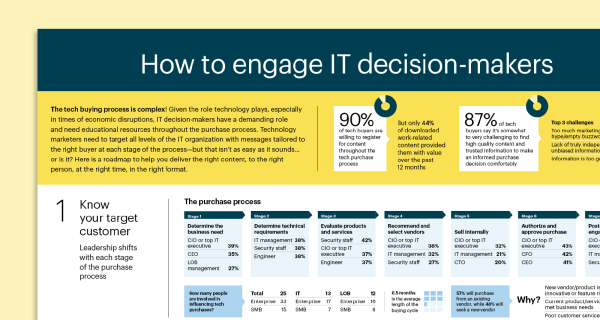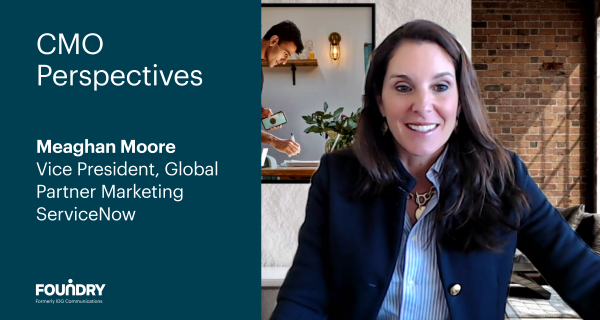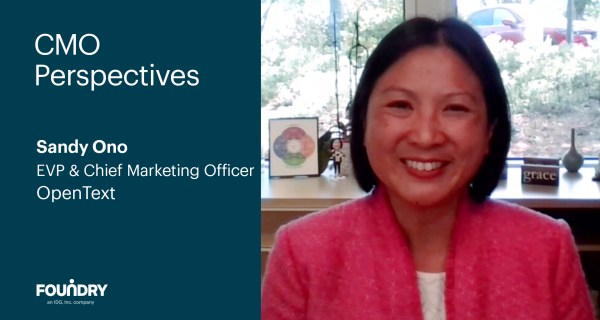In this episode of CMO Perspectives, Michael Beckley, Founder, Chief Technology Officer, and acting Chief Marketing Officer at Appian, joins Foundry’s Global CRO, Matt Yorke, to discuss redefining the technology industry. Most of the time, with new technology (looking at you, generative AI), the hype exceeds the reality—sometimes years ahead of time. When is the right time to embrace a new technology, adapt, or be conservative because the technology isn’t ready yet? In this episode, Matt Yorke and Michael Beckley delve into marketing with a technical background, the power of dissent, and remaining relevant in an evolving industry.
A technical CMO believes in the power of dissent
With all the information necessary to make educated purchase decisions right at their fingertips, the modern marketer has become sophisticated and savvy. Marketers need to acknowledge this as part of their strategy if they want to resonate with their customers and set themselves apart from their competitors. Operating in an environment of ultra-informed buyers, Beckley urges against throwing a ‘marketing spin’ on a product and instead wants his employees to simply speak to the merits of the solution. Beckley’s advantage as a technical CMO is that he can clearly explain the benefits of the Appian software and demonstrate to prospects how it fits into their business model.
Beckley advocates for a culture of dissent at work to navigate the frequent shifts in the technology industry and make appropriate business decisions. Encouraging your team to question and sometimes push back against new technology will enable them to empathize with consumers who do the same. With this adopted attitude, marketers and technology teams will be better equipped to steer their buying and selling efforts in the right direction, while prioritizing authentic product benefits. Despite the role of a marketing team, in part, being to build hype around a product, it is equally critical to be credible to customers by guiding them along their journey and assisting them in adopting new technology at the right time. By being honest about the state of the technology and straightforward about where a product will be best utilized, you can build invaluable trust and credibility with your customers.
Customer advocacy
Having successful customers explain how a product solves their business problems sets a company apart, especially in a saturated industry such as B2B technology. Formulating a customer advocacy program helps businesses break free from marketing echo-chambers and adopt a more customer-centric approach. When customers explain the value they see in an innovative product, they increase brand awareness, exposure, and drive organic demand. Potential clients trust the honest opinions of other customers, particularly as they become increasingly informed and presented with a surplus of options.
Appian boasts an impressive number of case studies, testimonials, and customer success stories on their website. It’s no surprise that Beckley recognizes the importance of customer advocacy and its critical role in Appian’s marketing strategy. He explains that technology does not matter if it fails to demonstrate value, and prospects need to envision themselves in the customer journey. These case studies not only provide mutual benefits for both clients and the business by showcasing innovative work but also serve to reinforce the culture of trust and credibility fostered by Beckley within Appian’s go-to-market strategy.
Remaining relevant
The key to remaining relevant in an evolving industry begins with building a powerful engine for capturing the way work happens, utilizing the complexity of the real world. Having a product that is relevant in a common way establishes a strong foundation for helping companies navigate the expected and frequent shifts in the technology industry. One of the more recent and drastic shifts, the pandemic, presented challenges to businesses with manual processes and forced them to reassess their operations in a new way—everything had to go digital. This digital transformation accelerated the established timelines that marketers previously had and highlighted the unpredictability of the industry.
Another critical aspect of staying relevant is equipping all employees with the tools to envision how work can be improved. There is often a natural skepticism towards young leaders, but by growing up alongside clients, businesses can establish themselves as credible advisors and partners while transforming core elements of their own operations. Involving more individuals, including the youngest generation, in envisioning better ways to optimize processes enables businesses to serve customers more efficiently and deliver more effective solutions to the market. Trusting the people who form your organization and being optimistic about your workforce allows you to challenge preconceived notions of how work is traditionally conducted and how it should be done.
————
About Appian
Appian was founded by four individuals—Matt Calkins, Bob Kramer, Marc Wilson, and Michael Beckley—in McLean, Virginia, in 1999. This non-traditional tech startup journey has led to sustained success, leading to the company going public in 2017. Today, Appian is trusted by some of the world’s largest brands. With their Appian platform, Appian is redefining the process management and orchestration industry through innovative technology in low-code development and automation.
About Michael Beckley
Michael is a founder of Appian, serving as the company’s Chief Technology Officer and currently acting as their Chief Marketing Officer. He drives the technical vision for the company, leads Appian’s product and solutions marketing teams, and oversees customer initiatives worldwide.
About the CMO Perspective video series
The CMO Perspectives series spotlights industry-leading executives who are making a difference within the tech marketing landscape. Our host, Matt Yorke, Global Chief Revenue Officer of Foundry, delves into the latest marketing trends, providing peer insights for tech marketers.






